- Home
- Gail Godwin
The Finishing School
The Finishing School Read online
More praise for Gail Godwin
and The Finishing School
“Long before the terms ‘role model’ and ‘mentor’ entered common parlance, adolescents sought the company of grown-ups, other than their own parents, whose sympathetic interest and vivid presence represented the best of the adult world.… In her fine novel, The Finishing School, Gail Godwin charts the exhilaration, the enchantment, the transformation, then the inevitable disillusionment and loss inherent in such a friendship and such self-discovery.… Her characterization is one of the most trustworthy portraits of an adolescent in current literature.”
—The New York Times Book Review
“She never for a second loses the reader’s attention.”
—The Wall Street Journal
“An arresting story … The pleasure of reading The Finishing School is nearly equaled by the fun of thinking about it afterward.”
—The New York Times
“Makes an indelible impression … Gail Godwin is in top form!”
—San Diego Tribune
“An engaging, shapely narrative of cumulative power … It helps us to live our lives.”
—The New Republic
“Marvelous, moving drama … Not only the dominant strains of the story keep running through one’s head, but all those deeply buried harmonies and variations, too.”
—Mademoiselle
“Irresistible storytelling … Just as immediate and affecting as A Mother and Two Daughters.”
—Kirkus Reviews
The Finishing School is a work of fiction. Names, places, and incidents are the products of the author’s imagination or are used fictitiously. Any resemblance to actual events, locales, or persons, living or dead, is entirely coincidental.
A Ballantine Book
Published by The Random House Publishing Group
Copyright © 1984 by Gail Godwin
Reader’s Guide copyright © 2004 by Gail Godwin and The Random House
Publishing Group, a division of Random House, Inc.
All rights reserved under International and Pan-American Copyright Conventions. Published in the United States by The Random House Publishing Group, a division of Random House, Inc., New York, and simultaneously in Canada by Random House of Canada Limited, Toronto. Originally published by Viking Penguin Inc. in 1984.
Grateful acknowledgment is made to W.W. Norton & Company, Inc., St. John’s College, Oxford, and The Hogarth Press Ltd. for permission to reprint a selection (Second Part, 23rd Sonnet) from Sonnets to Orpheus, by Rainer Maria Rilke, translated by M. D. Herter Norton. Copyright 1942 by W. W. Norton & Company, Inc. Copyright renewed 1970 by M. D. Herter Norton.
Ballantine and colophon are registered trademarks of Random House, Inc.
Ballantine Reader’s Circle and colophon are trademarks of Random House, Inc.
www.ballantinebooks.com/BRC
Library of Congress Control Number 99-90162
eISBN: 978-0-345-47226-7
v3.1
Contents
Cover
Title Page
Copyright
Epigraph
Chapter I
Chapter II
Chapter III
Chapter IV
Chapter V
Chapter VI
Chapter VII
Chapter VIII
Chapter IX
Chapter X
Chapter XI
Chapter XII
A Reader’s Guide
Dedication
Other Books by This Author
About the Author
Bang verlangen wir nach einem Halte, wir zu Jungen manchmal für das Alte und zu alt für das, was niemals war.
(Anxiously we clamor for a hold, we, too young sometimes for what is old and too old for that which never was.)
—Rainer Maria Rilke, Sonnets to Orpheus, II, 23 (translated by M. D. Herter Norton)
I.
Last night I dreamed of Ursula DeVane. We were sitting on the crumbling threshold of The Finishing School, and she was telling me something in her rich and compelling voice. Then, suddenly, the sky turned an ominous color, the pond shivered like a live thing, the old pines hissed and swayed, and hard rain pelted down.
“Let’s make a run for it!” said Ursula, tensing her body for the dash.
“But why?” I asked. “We’ll get soaked. Why not sit here and wait it out?”
“Ah, Justin,” she said, putting her arm around my shoulders and giving me a shake. “Haven’t I taught you anything? Didn’t you learn anything from me?”
She leapt up and hurled herself boldly into the storm. Lightning cracked all around her. She was wet to the skin before she had even reached the far side of the pond. I huddled in the shelter of The Finishing School and watched with mounting despair as her figure grew smaller and dimmer in the downpour. I knew if I did not jump up and run after her now that I would lose her forever. But I was powerless to move.
When I woke, I could still feel the pressure of her touch on my shoulders. I could hear the pitch of her tender, teasing voice. All day I have gone around under the spell of that dream.
Is it the dream that has its hold on me, or is it Ursula herself, after all these years? In the dream we were the same age, both young girls; yet when I knew Ursula, that single summer, she was a woman of forty-four and I had just turned fourteen.
All day I have wondered whether I would want to see the real Ursula again, even if I knew where to find her. She would be seventy this year, if she is still alive. How would I feel about her now? Would she be very changed? Or would she, regardless of age and of the hardships she may have suffered since that summer’s end, still retain the power to bewitch my imagination? Would her voice still enchant with its melody and its challenge? How would she feel about me? Would she be glad to see me, or would what happened at the end of the summer have eclipsed our friendship and made her bitter and angry? If I were to see her again, what would I say?
(Ursula, which were the true parts and which parts did you make up? Do you know, I am still trying to sort out which was which?
You’ll be gratified to hear—at least, I hope you will—that I did choose a life in the arts. “Your soul craves that constant heightening of reality only art can give,” you told me one afternoon, down at the old stone hut by the pond, which you called my “Finishing School,” where you enthralled me with tales of your past and planted aspirations in me.
I’m sorry for the way I behaved at the end. The older I get, the more cruel that behavior seems. Yet, at the time, I was unable to behave any other way.
If you hadn’t materialized that summer, I would have had to invent someone like you. If I hadn’t come along, whom would you have invented? A girl like me? Or would just any gullible audience have served your purpose?
For what it’s worth, you left your mark on me. Despite everything that happened, I have absorbed you. As long as I live, you live in me. Sometimes I hear myself speak in your voice. And, as you did, I watch its effects on others.)
I am a great respecter of dreams. Many turning points in my life have been heralded by dreams. A few have actually occurred in dreams. I believe that dreams transport us through the undersides of our days, and that if we wish to become acquainted with the dark side of what we are, the signposts are there, waiting for us to translate them. Dreams say what they mean, but they don’t say it in daytime language.
A friend tells me she dreams regularly of a girl named Megan, whom she hated in grammar school. But over the years, in these dreams, Megan has grown up along with my friend, and they have become important to each other. My friend says she actually looks forward to her Megan dreams. In these dreams, after an initial animosity, the two get together and rev
eal how they have always secretly admired each other and wanted to be friends. Each shows striking insights into the other’s nature and confides to her what strengths she has been jealous of all these years. The two of them discover they are opposites of the same self.
“But what about the real Megan?” I asked her. “Have you ever tried to get in touch with her again?”
“Good heavens, no.” My friend laughed. “I’m sure she grew up to be a horrible person.”
Which is to say: I won’t hire a detective to go in search of a real seventy-year-old woman, who might still be found. (And who, perhaps, would retain her power to shatter or elude all my ideas of the kind of seventy-year-old woman she might have become, just as, during that summer, she was never as I expected her to be, from visit to visit.) But I will attend to what her image, playing its role in last night’s dream, came to tell me. This is not the first time I have dreamed of Ursula DeVane. I dreamed of her on the night of the day I met her, and many times since. I will probably be dreaming about her for the rest of my life. She, along with a few others, has claimed a permanent place in the theater of my unconscious, where each figure—based wholly or in part on some real person—has its function.
When Ursula appears in a dream, it is usually to stir things up.
“There are two kinds of people,” she once decreed to me emphatically. “One kind, you can tell just by looking at them at what point they congealed into their final selves. It might be a very nice self, but you know you can expect no more surprises from it. Whereas, the other kind keep moving, changing. With these people, you can never say, ‘X stops here,’ or, ‘Now I know all there is to know about Y.’ That doesn’t mean they’re unstable. Ah, no, far from it. They are fluid. They keep moving forward and making new trysts with life, and the motion of it keeps them young. In my opinion, they are the only people who are still alive. You must be constantly on your guard, Justin, against congealing. Don’t be lulled by your youth. Though middle age is the traditional danger point, I suspect that many a fourteen-year-old has congealed during the long history of this world. If you ever feel it coming, you must do something quickly.…”
Over the years, her vivid figure of speech has stayed in my mind. “Am I congealing?” I ask myself. “Am I getting stuck in a role, repeating myself?” Or I will think, Poor So-and-So has congealed, gathering his same old themes around him like a shroud and being content to embroider them. I wonder if he knows it.
What would I be like if I congealed? Would I know it? Would I go on doing my work? Would others know?
The Ursulas of the world would.
“It’s too bad about Justin,” I can hear her say, launching into that musical tone she used when taking apart people’s characters or summing up their fates. “When I knew Justin, she was just a young girl with large, questing eyes and very brown legs from riding her bicycle away from a house that was boring her to death. She was new to our village; she was disoriented. She had lost all the props that defined her. At the time we met, she saw herself as the victim of Tragedy: in a relatively short period, she had lost the grandparents who raised her, her father, and then her home. That is a lot to lose, of course, but hardly Tragedy to someone like myself, whose family contretemps would have kept Sophocles and Ibsen scribbling around the clock if they’d lived in our neighborhood. No, there are things much more tragic than the deaths of pleasant, unexceptional people and having to start all over in a new place.
“The girl’s situation interested me, however. I have always been drawn to stories in which people have to start over. I saw immediately that, for all her sadness and disorientation, this girl was determined to escape the ordinary and had the intelligence to see that I was her best bet in the village. So you might say I was initially flattered by her recognition—one is taught by experience to put a premium on those few people who can appreciate you for what you are—and then I grew fonder of her as the summer progressed. There was a sweet, old-fashioned gravity about her; unlike most young people, she listened well. I loved to watch her face as she listened, and also when she struggled to articulate her thoughts. She was not as eloquent as she wanted to be, but she was better than she knew. I did what I could for her: fed her mind and stoked her desire for the larger life. If she hadn’t burst in on me that summer, who else could have done it for her? Yes, I take my share of the credit for what she has become. Not that she ever thanked me for it. And she was very cruel at the last.
“I’m sorry, all the same, that she is in danger of congealing. She doesn’t know where I am, but I’ve kept up with my old protégée, and I’m sad to say she shows signs of falling into complacency, that alarming early warning signal of congealment. She’s done well, of course, but to reach the range and intensity I have seen others capable of, she must tap new sources of feeling. Or old sources which she turned away from at the end of that summer, when she was afraid and confused. Ah, Justin, if you were to come riding over to me again, I would stir up your blood. ‘Don’t you recall,’ I would say, ‘how I warned you to be alert for the first signs of jellification? How you must fight, the moment you feel its clammy grip. You must hurl yourself into action, take some new risk. Remember my ancestors, the Sires DeVeine; how, every spring, when the snows melted, they roused themselves from the snug stronghold of all their old trophies and triumphs and rode boldly down the Jura Pass looking for trouble?
“ ‘When did you last leave your stronghold, Justin? When was the last time you went out alone, forsaking all the props that have come to define you?’ ”
Fourteen. Be fourteen again. Is that possible? Can I ride back into the country of youth, even on the conveyance of memory, propelled by imagination?
It was a long time ago. I was such a different person. What connection is there between the woman I am now and that lost, diffident girl pedaling up the steepest part of Old Clove Road, silently bargaining with herself, If I can reach the top of the hill without getting off my bike, something will happen, something will change …? Well, right there is a connection. I still make superstitious bargains with myself. Only now I usually bargain for something specific. I have come to know, perhaps too well, what I want. On that May afternoon, I wished only for something interesting enough to rescue me from my present life.
Actually, I was not yet fourteen. My birthday was a month away. We had been living in this rural community—the township of Clove—in upstate New York for one month, my newly widowed mother, my little brother, and I. I still thought of it as enemy territory. Wasn’t it part of “the North” that I had been brought up to hate because its interference and brutalities had destroyed our gracious past? By sheer geography, these Clove families with their harsh and peculiar names of Terwiliger and Hasbrouck and DePuy and Osterhoudt were implicated with the rude general who, my grandfather said, had not had the decency to remove his foul-smelling cigar from his mouth while our noble Lee was in the act of signing away our way of life.
Not only that, but the people here were different. They were deep in themselves and slow to respond, not given to graces or flourishes. They were like their weather. As we had come north, last month, on the train from Virginia, I had watched in dismay as the green on the trees folded back into red buds and then disappeared altogether as we came close to our destination. Why had my mother done this to us? I still could not understand. She had said we could no longer afford to live in the big house on Washington Avenue, the only house I had known in my life. Well, I had accepted that. My grandparents’ illnesses had eaten up the family savings and my father’s accidental death had robbed us of our only breadwinner. But why could we not have stayed on in the place where people had always known us? We could have moved into a smaller house and cheerfully pinched our pennies the way fatherless families did in books. Everybody would have said, “Look how hard Dr. Frank Justin’s poor daughter is trying,” and would have helped us, would have encouraged us in our bravery. But my mother had decided instead to throw away everything familiar and move us north, in
to Aunt Mona’s house. Aunt Mona was my father’s sister. She and her husband had just separated, and she had the room for us. My mother said she was doing this for our future, for my brother Jem’s and my college education. But I couldn’t stop believing she had done it out of some perverse love of extremes: if she could no longer go on being the protected wife and daughter, then she would be the martyr. It was as if she were so grieved by all she had lost that she didn’t want to leave herself a single thing to be thankful for. Of course, as she kept saying, she still had us. But by bringing us away from all we had known, hadn’t she hurt us, too?
And as I pumped and puffed up the strenuous hill of Old Clove Road that warm May afternoon, I held myself back from any love of the place, even though the sun made the backs of my legs feel warm and alive, even though the landscape, with its old farmsteads and freshly sown fields, its rural scents and roadside blossoms, was now as lovely and as fragrant as any country road in Virginia.
Every afternoon I rode my bike compulsively on this picturesque and meandering route I had learned from the school bus that took me to and from my new school. I rode to flee my Aunt Mona’s house, to emphasize my solitary state, to give myself the illusion of going somewhere.
My turning-around point on Old Clove Road was at the top of the hill, where the land leveled off at the Cristianas’ horse farm. On the left side of the road was their gaunt frame house with its peeling gray paint, and, to the side of the house, a well-raked stableyard bracketed by smart, streamlined stalls. The roofs of the stalls were in better shape than the Cristianas’ roof, and the stalls had new white paint, with dark green trim around the doors, where the horses stuck their heads out. From the looks of things, horses lived better than people here. A professionally hand-lettered sign hanging from the crossbar of the main gate read:
CRISTIANA PATROON FARM

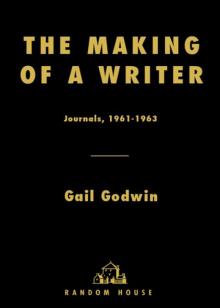 The Making of a Writer
The Making of a Writer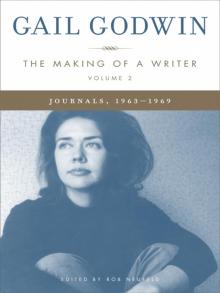 The Making of a Writer, Volume 2
The Making of a Writer, Volume 2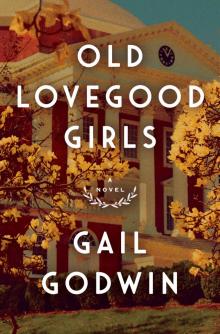 Old Lovegood Girls
Old Lovegood Girls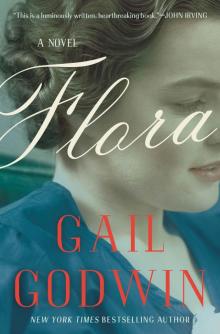 Flora
Flora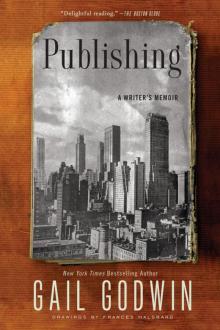 Publishing
Publishing The Finishing School
The Finishing School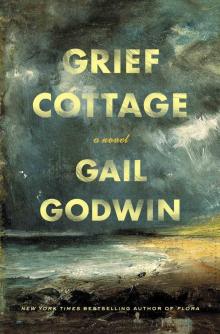 Grief Cottage
Grief Cottage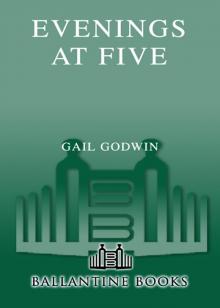 Evenings at Five
Evenings at Five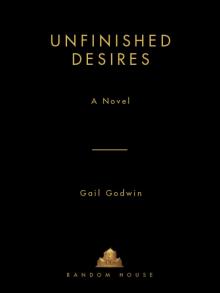 Unfinished Desires
Unfinished Desires